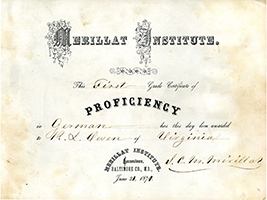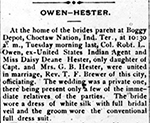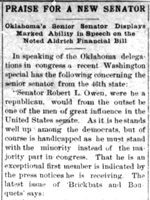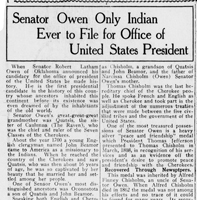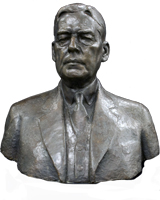The Life of Robert L. Owen, Jr.:
A Chronology
2/2/1856
Birth
Robert Latham Owen, Jr. was born in Lynchburg, Virginia, to Robert L. Owen, Sr. and Narcissa Chisholm. Narcissa was from Indian Territory and was part Cherokee.
6/2/1872
Father Died
Robert Owen, Sr. died deeply in debt after struggling to regain control of Virginia and Tennessee Railroad, for which he had served as president for several years. Later, Owen said the economic disruption of those years impressed on him several economic lessons.
1877
Graduated
Owen graduated with a master’s degree from Washington and Lee University in Lexington, Virginia.
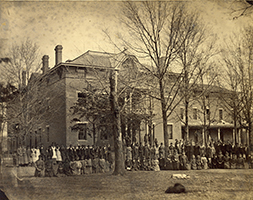
1879
In Indian Territory
Owen migrated to Cherokee Nation where he was employed as principal at the Cherokee Orphan Asylum, Salina.
1880 to 1885
Multiple Positions & Ventures
- Served as secretary of the Cherokee Board of Education
- Studied law and passed bar
- Owned and edited the Vinita Indian Chieftain
- Served as president of the International Indian Fair at Muskogee
- Sought grazing land leases in the Cherokee Outlet
- Acquired oil lease for the entire Cherokee Nation
1885 to 1889
Indian Agent
Owen served as Indian Agent at the Union (Five Tribes) Agency in Muskogee, Indian Territory.
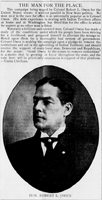
1889 to 1907
Attorney, Businessman, Democratic Politician
1890
He helped establish the First National Bank of Muskogee, the first bank under federal government charter in Indian Territory.
1896
Served as delegate to the Democratic National Convention in Chicago: Owen discussed the monetary issue thoroughly prior to the convention, served as a member of the platform committee, and proposed a unique idea for the federal government to issue emergency currency in times of panic.
1899
Owen studied European banking procedures. While on a family vacation in Europe, Owen visited several banks and discussed European methods with leaders in the business.
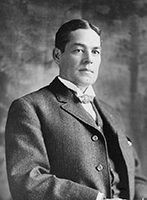
1907 to 1913
1st Term as U.S. Senator
Major Banking/Monetary Issues in 1st Term:
2/25/1908
First Major Speech: In a debate on the Senate floor Owen attacked Senator Nelson Aldrich and his bill, later known as the Aldrich-Vreeland Act. The legislation attempted to address the causes of the banking Panic of 1907 and created a commission to study the banking system.
December 1909
Discussion of the Postal Savings Bank: Owen staked out a position on the postal savings bank and advocated guarantee of bank deposits.
Other Issues during 1st Term:
- Proposed creation of U.S. Department of Health
- Promoted various direct democracy devices
- Led fight for the Removal of Restrictions Act, which removed most restrictions from sale of Indian lands in Oklahoma
- Took part in controversies of Taft Administration—Payne-Aldrich Tariff
- Pushed for various changes in Indian Policy—many self-serving
1913 to 1919
2nd Term as U.S. Senator
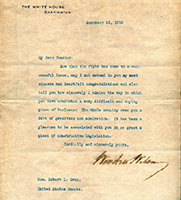
1913
Federal Reserve Act
1914
He proposed a bill to control the stock market. This was a precursor of SEC but it failed in committee.
1914 to 1915
Other Issues Involving Creation and Structuring of the Federal Reserve Board:
- Appointment of national Federal Reserve directors
- Structure and operation of regional banks
- General functioning of the new system
1917 to 1918
Promoted “Federal Reserve Foreign Bank” to deal with International Finance
- Included alliance with Nathan Musher, Baltimore olive oil importer
- Designed to stabilize and make international currency uniform
1918
Involved in Creation of War Finance Corporation
Other Issues during 2nd Term:
- Helped found and promote the National Popular Government League (advocated direct democracy)
- Fought for change in cloture rules in U.S. Senate (limiting filibustering)
- Aided Senator Robert M. LaFollette (Wisconsin) with his Seaman’s Bill (1915), which protected rights of merchant marine employees at sea
- Sponsored and assisted with passage of Keating-Owen Child Labor Act (1916)
- Supported independent oil companies in Oklahoma
- Pushed for legislation involving Indian affairs—again, often to protect his own interests in Oklahoma
1919 to 1925
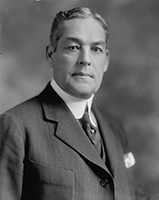
3rd Term at U.S. Senator
1918 to 1919
Owen continued promotion of a Federal Reserve Foreign Bank & Foreign Finance Corporation.
1919 to 1920
He criticised Federal Reserve deflationary policies affecting agriculture
1922 to 1923
He revived Federal Reserve Foreign Bank and Foreign Finance Corp. ideas, however, they failed.
Other Issues during 3rd Term:
- Owen was one of the leaders attempting to reach compromise on the League of Nations
(1919 to 1920) - He allied with National Popular Government League in criticizing Palmer Raids during Red Scare
- Owen became a revisionist on the causes of World War I
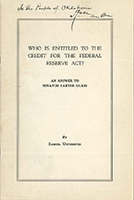
1927
Debate over Authorship of Federal Reserve Act
Carter Glass published the book, Adventures in Constructive Finance, which seemed to claim the most credit for writing and introducing the original bill. Owen’s friend, Samuel Untermeyer, responded with a pamphlet refuting Glass.
1933 to 1941
Owen Criticized Federal Reserve Policies and Tangled with Glass
Upon the election of Franklin D. Roosevelt, Carter Glass played a major role in restructuring the Federal Reserve and other in formulating other monetary and banking policies.
Owen supported Roosevelt, but soon criticized the Federal Reserve’s policies.
The conflict with Glass became vitriolic.

